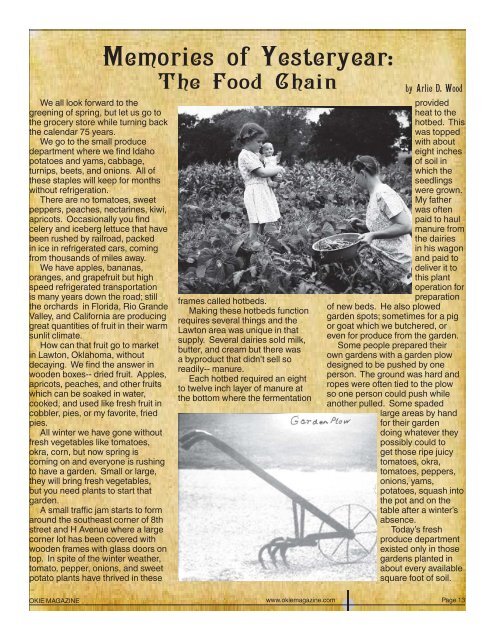You also want an ePaper? Increase the reach of your titles
YUMPU automatically turns print PDFs into web optimized ePapers that Google loves.
We all look forward to the<br />
greening of spring, but let us go to<br />
the grocery store while turning back<br />
the calendar 75 years.<br />
We go to the small produce<br />
<br />
potatoes and yams, cabbage,<br />
turnips, beets, and onions. All of<br />
these staples will keep for months<br />
without refrigeration.<br />
There are no tomatoes, sweet<br />
peppers, peaches, nectarines, kiwi,<br />
<br />
celery and iceberg lettuce that have<br />
been rushed by railroad, packed<br />
in ice in refrigerated cars, coming<br />
from thousands of miles away.<br />
We have apples, bananas,<br />
oranges, and grapefruit but high<br />
speed refrigerated transportation<br />
is many years down the road; still<br />
the orchards in Florida, Rio Grande<br />
Valley, and California are producing<br />
great quantities of fruit in their warm<br />
sunlit climate.<br />
How can that fruit go to market<br />
in Lawton, Oklahoma, without<br />
<br />
wooden boxes-- dried fruit. Apples,<br />
apricots, peaches, and other fruits<br />
which can be soaked in water,<br />
cooked, and used like fresh fruit in<br />
cobbler, pies, or my favorite, fried<br />
pies.<br />
All winter we have gone without<br />
fresh vegetables like tomatoes,<br />
okra, corn, but now spring is<br />
coming on and everyone is rushing<br />
to have a garden. Small or large,<br />
they will bring fresh vegetables,<br />
but you need plants to start that<br />
garden.<br />
<br />
around the southeast corner of 8th<br />
street and H Avenue where a large<br />
corner lot has been covered with<br />
wooden frames with glass doors on<br />
top. In spite of the winter weather,<br />
tomato, pepper, onions, and sweet<br />
potato plants have thrived in these<br />
Memories of Yesteryear:<br />
The Food Chain<br />
frames called hotbeds.<br />
Making these hotbeds function<br />
requires several things and the<br />
Lawton area was unique in that<br />
supply. Several dairies sold milk,<br />
butter, and cream but there was<br />
a byproduct that didn’t sell so<br />
readily-- manure.<br />
Each hotbed required an eight<br />
to twelve inch layer of manure at<br />
the bottom where the fermentation<br />
by Arlie D. Wood<br />
provided<br />
heat to the<br />
hotbed. This<br />
was topped<br />
with about<br />
eight inches<br />
of soil in<br />
which the<br />
seedlings<br />
were grown.<br />
My father<br />
was often<br />
paid to haul<br />
manure from<br />
the dairies<br />
in his wagon<br />
and paid to<br />
deliver it to<br />
this plant<br />
operation for<br />
preparation<br />
of new beds. He also plowed<br />
garden spots; sometimes for a pig<br />
or goat which we butchered, or<br />
even for produce from the garden.<br />
Some people prepared their<br />
own gardens with a garden plow<br />
designed to be pushed by one<br />
person. The ground was hard and<br />
ropes were often tied to the plow<br />
so one person could push while<br />
another pulled. Some spaded<br />
large areas by hand<br />
for their garden<br />
doing whatever they<br />
possibly could to<br />
get those ripe juicy<br />
tomatoes, okra,<br />
tomatoes, peppers,<br />
onions, yams,<br />
potatoes, squash into<br />
the pot and on the<br />
table after a winter’s<br />
absence.<br />
Today’s fresh<br />
produce department<br />
existed only in those<br />
gardens planted in<br />
about every available<br />
square foot of soil.<br />
OKIE MAGAZINE www.okiemagazine.com Page 13


